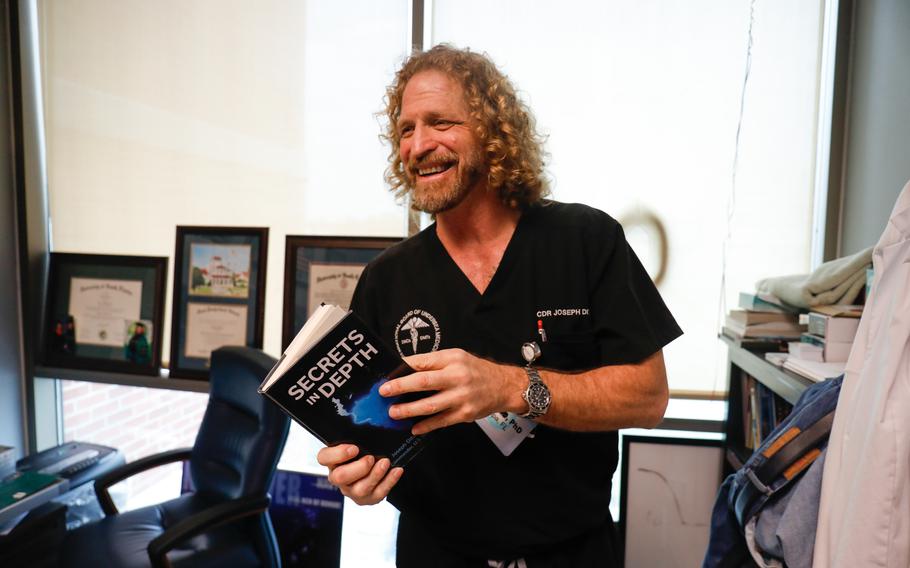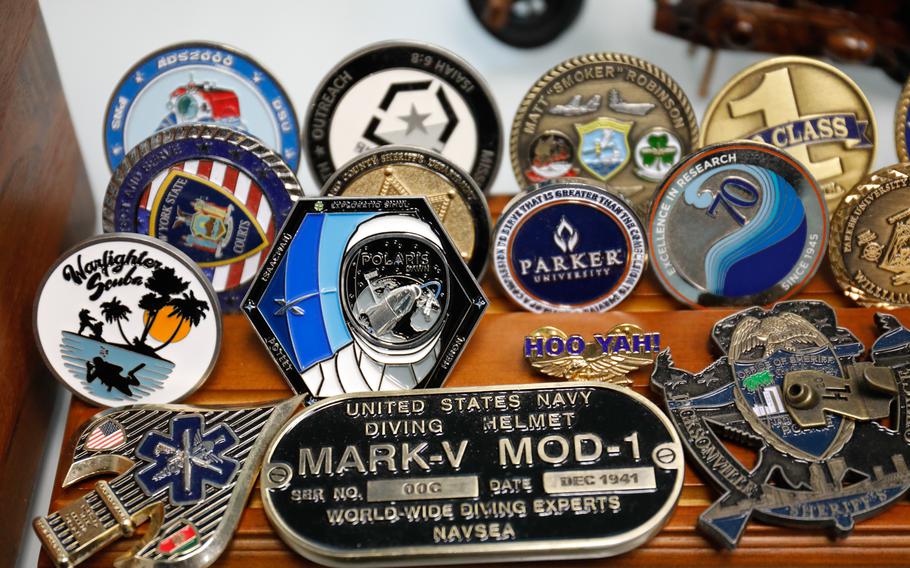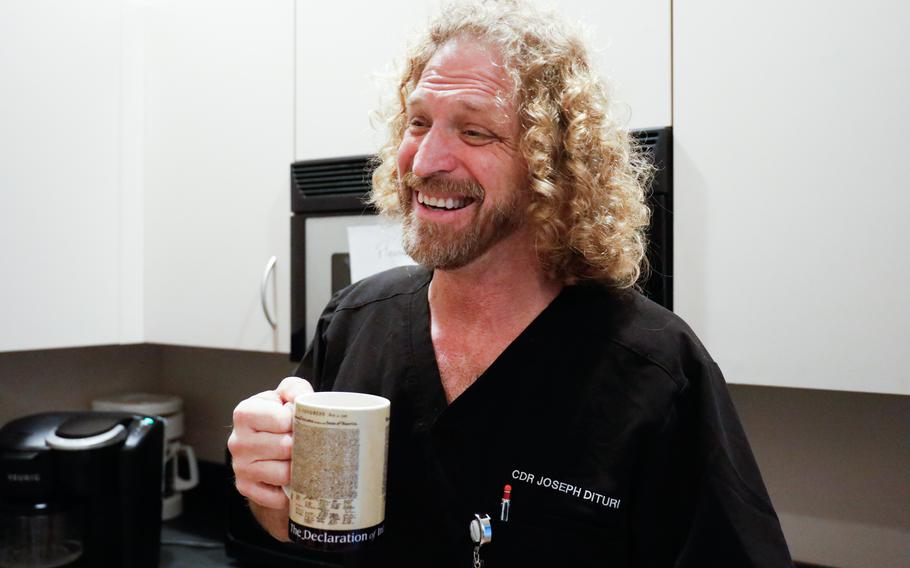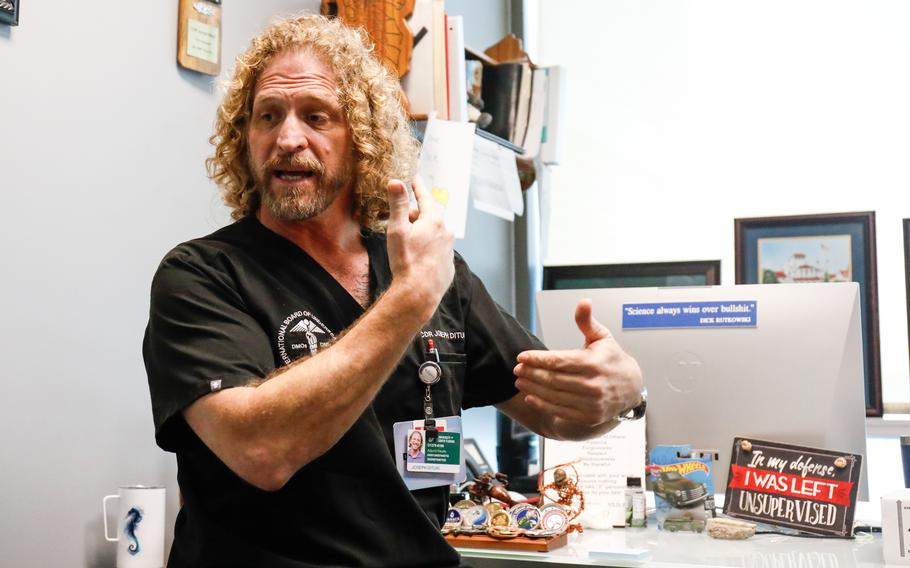
Researcher Joseph Dituri holds a copy of his book inside his office at the Undersea Oxygen Clinic in Tampa, Fla. (Jefferee Woo, Tampa Bay Times/TNS)
(Tribune News Service) — When Joseph Dituri thought about what he’d miss most during the record-breaking 100 days he spent underwater, hot coffee with French vanilla creamer was not at the top of his list.
He knew he would miss his three daughters, his mom, his girlfriend, his surfing, his sunrise and sunset walks, his friends. Years of Navy deployments prepared him for those.
It was the little luxuries he says he took for granted: being able to stand up straight without his head scraping the ceiling, his daily call with a childhood friend, eating a hot meal — and, of course, the coffee.
Dituri surfaced June 9 from a 100-square-foot habitat nestled 22 feet beneath the surface of a Key Largo lagoon, topping the previous record of 73 days underwater. He spent his days in virtual communication with people on land, speaking to children in classrooms across the globe and teaching a hyperbaric medicine class at the University of South Florida, where he works as an associate professor. He drew his own blood to see how the extended time without depressurization affected various medical markers.
Now, instead of waking up at 5 a.m. to attach electrodes to his head, Dituri rises before dawn to go to the gym, watch the sunrise and work at his hyperbaric therapy center in Tampa, the Undersea Oxygen Clinic.
It’s clear that he’s missed his job and the human interaction it entails.
“How you doing, handsome?” he says to one patient being maneuvered into the hyperbaric chamber.
“I love your sweatshirt,” he says to another sitting in the waiting room.
Dituri attracted worldwide attention — and the nickname of “Dr. Deep Sea” — emerging from the water. But now, as the days pass, he relishes in the small moments he hadn’t experienced in months. He also finds himself still playing catch-up with a world that did not stop moving when he last stepped foot on solid ground.
“When you’re used to being in a very small area and then all of a sudden things are going like this at you,” Dituri said, making frantic, stabbing gestures with his hands, “that’s a little bit daunting. It reminds you that you are not integrated fully into the world yet.”
Dituri’s first dive was at 9 years old, in the canals of New York City, after his dad needed him to go under the family’s boat to help with some maintenance. He was immediately hooked: so hooked that he started cutting class, which, coupled with his “abysmal” SAT score, gave him few options after graduation other than enlisting. He loved the water, so he chose the Navy.

Joseph Dituri displays some memorabilia inside his Tampa office. (Jefferee Woo, Tampa Bay Times/TNS)
He served for 28 years as a diver and submersible expert, earning a bachelor’s degree in computer science and a master’s in astronautical engineering, and retired as a Special Operations Commander.
Because Dituri witnessed countless traumatic brain injuries while enlisted, he decided to focus his post-Navy career on the brain.
He went on to earn a doctoral degree in biomedical engineering at USF, then opened his hyperbaric oxygen therapy center. He hoped to heal the type of brain injuries that weren’t easily seen in an MRI but still affected people’s quality of life.
And then, one afternoon in 2021, he was waiting at a Tampa traffic stop in his fire engine red 1947 Chevy pickup (chosen in honor of his deepest dive, which was 1,947 feet), when a car plowed into the driver’s side.
Dituri, who had devoted his life to the secrets of the brain, found himself facing the same struggles as his patients with traumatic brain injuries. He couldn’t recognize longtime friends, couldn’t balance on his own, couldn’t regulate his emotions.
Doctors told him that the only solution was “a tincture of time,” which Dituri said was not enough.
Under his guidance, his clinic introduced a more holistic approach than mere oxygen therapy, including ice baths, neurofeedback therapy and peptide treatments to promote cell repair. The new model, he said, proved instrumental in his own healing.
When Dituri went underwater, then, one of his goals was to prove that this type of regimen benefits the body, as the water pressure he experienced mirrored that of his clinic’s oxygen chambers. For him, it did help — drastically.

Joseph Dituri enjoys a cup of coffee inside a break room at his office — a small luxury he craved while living underwater. (Jefferee Woo, Tampa Bay Times/TNS)
While underwater, he spent the majority of his sleep cycle in REM — the state characterized by rapid eye movement and dreaming — as opposed to the average 20%. His cholesterol dropped 72 points, a decrease of more than a quarter (despite eating “the same or worse”), and his inflammatory markers, tests that are used to detect inflammation in the body, were reduced by half.
His next step, he said, is to publish a research paper and present it at the World Extreme Medicine Conference in November.
But Dituri had other motives as well. One was for science more broadly: He did something no human has done before, an important step in understanding the capabilities of the body. Another was to inspire a new generation of scientists. He spoke to over 5,000 students and, for his USF class, used his own medical data as real-life examples.
Breaking the world record was a plus, he said, but ultimately, he wanted to show that being in a small, isolated place for a long period of time is possible.
That’s because of the final reason for his project: So he can, one day, go to space.
“I stayed for 100,” Dituri said. “We need to go for 200.”
He was referring to the 200 days that experts estimate it would take for a spacecraft to reach Mars. A vision board in Dituri’s office makes it clear that, for him, Mars is the final frontier.
For 2021, next to a picture of an underwater hotel with his face photoshopped into a porthole, he wrote “100 Day living in the ocean.”
For 2026, he wrote “Hair in space,” referring to the red, curly locks he began to cultivate after his time in the Navy.
His personal hero is not an ocean explorer but Buzz Aldrin, the second person to walk on the moon and a staunch advocate for missions to Mars. Dituri says that he, like Aldrin, has unbridled faith in humanity’s ability to constantly discover and achieve.
“People are doing amazing things,” he said. “I’ve never been so inspired.”
That’s why he spent over five figures of his own money to fund his expedition (drawing from what he calls “The International Bank of Joe.”)
That’s also why, even though he just got his feet on the ground, he’s already looking to leave.
©2023 Tampa Bay Times.
Visit tampabay.com.
Distributed by Tribune Content Agency, LLC.

Joseph Dituri is still adjusting to life on land, he said during an interview inside his office at the Undersea Oxygen Clinic. (Jefferee Woo, Tampa Bay Times/TNS)